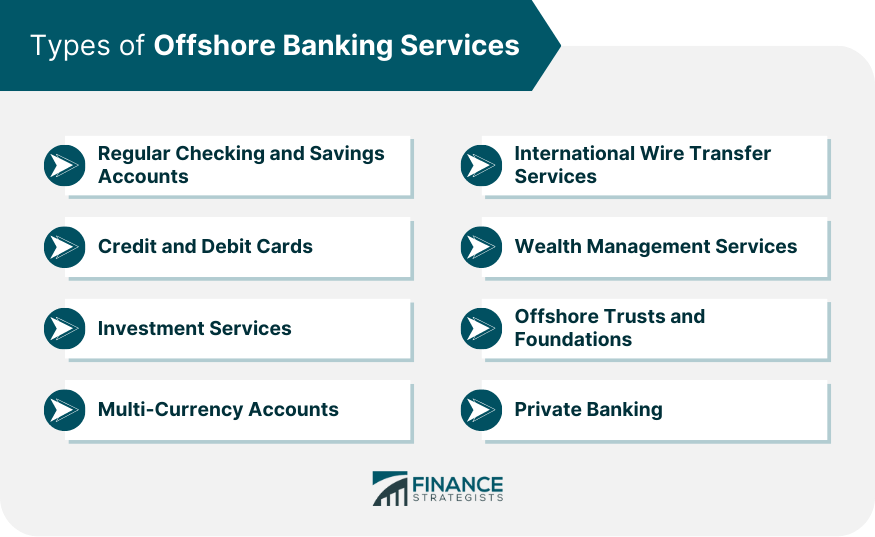Why Country Credibility Matters in Offshore Company Formations
Wiki Article
Demystifying Offshore Company Formations: Exactly How They Run and What to Expect
Offshore firm formations can seem facility and enigmatic. Offshore Company Formations. These entities, typically established for tax benefits and personal privacy, operate under distinct legal frameworks. Entrepreneurs may discover themselves maneuvering through a maze of laws and conformity demands. Recognizing the ins and outs is important for success. What are the genuine advantages? What are the potential pitfalls? A closer assessment exposes the nuances that could impact decision-making substantiallyRecognizing Offshore Business: Types and meanings
Offshore business are entities developed in a territory beyond a person's or service's key country of house, often for objectives related to tax obligation optimization, possession protection, or governing benefits. These business can take numerous types, including restricted obligation business (LLCs), international service companies (IBCs), and offshore counts on. Each type serves specific functions and attract different needs.Restricted liability business offer proprietors with protection from individual liability, while worldwide service companies are prominent for their adaptability and very little reporting demands. Offshore trusts, on the other hand, are used mostly for estate planning and asset defense.
The option of territory substantially affects the business's procedures, as some places supply more positive lawful frameworks and privacy defenses. Offshore Company Formations. Comprehending the differences between these types is essential for companies and people thinking about overseas frameworks, as each alternative brings different ramifications for governance and compliance
The Benefits of Establishing an Offshore Company
Establishing an offshore company can supply many benefits, specifically for those seeking to improve their economic strategies and shield their possessions. One significant benefit is tax optimization; several jurisdictions use desirable tax prices or exemptions, permitting companies to retain even more earnings. In addition, offshore companies can provide a layer of personal privacy, securing the identities of proprietors and shareholders from public examination.An additional advantage is property protection. By placing properties in an overseas entity, individuals can protect their wealth from potential legal insurance claims or political instability in their home countries. This structure also promotes global business procedures, allowing less complicated accessibility to diverse clientele and worldwide markets.
Moreover, the facility of an offshore company can boost integrity and status, appealing to customers that value global company practices. Generally, these advantages make offshore firm formations an appealing alternative for businesses and individuals going for financial development and security.
Trick Factors To Consider Prior To Forming an Offshore Entity
Prior to forming an offshore entity, a number of vital elements need to be evaluated. Lawful compliance needs, tax effects and advantages, as well as jurisdiction option, play a substantial duty in the decision-making procedure. Recognizing these factors to consider can aid people and services navigate the intricacies of offshore company formations successfully.
Lawful Compliance Demands
When taking into consideration the formation of an offshore entity, understanding lawful compliance needs is necessary to guarantee adherence to both neighborhood and global regulations. Prospective entrepreneur must familiarize themselves with laws controling business registration, reporting obligations, and functional standards in the picked territory. This includes validating the lawful requirements for shareholders and supervisors, as well as making certain compliance with anti-money laundering (AML) and know-your-customer (KYC) guidelines. Additionally, organizations must continue to be familiar with any licensing demands details to their market. Engaging local lawful and economic professionals can offer useful understandings, ensuring that all required documents is prepared and sent properly. Inevitably, extensive understanding of legal compliance aids minimize threats and cultivates a lasting overseas procedure.Tax Obligation Effects and Benefits
Countless business owners think about the tax obligation effects and benefits of developing an offshore entity as an essential factor in their decision-making procedure. Offshore business can offer significant tax benefits, such as minimized company tax obligation prices, exception from specific neighborhood tax obligations, and the capability to defer tax obligations on international revenue. These advantages can lead to enhanced success and money flow, making offshore structures appealing for international company operations. Furthermore, the capacity for tax obligation treaties might even more reduce tax obligation responsibilities. However, it is essential for company owner to comprehend the intricacies included, including conformity with both international and neighborhood tax policies. Involving with tax specialists is suggested to navigate these ins and outs successfully and ensure optimal tax obligation planning strategies.Territory Selection Variables
What elements should one think about when picking a jurisdiction for overseas firm development? Secret factors to consider consist of tax performance, regulative environment, and political stability. Territories with beneficial tax obligation programs can greatly impact earnings. The governing landscape should provide flexibility and ease of compliance, permitting effective organization procedures. Political security is crucial, as it assures the safety of possessions and connection of procedures. Furthermore, the online reputation of the territory can affect customer depend on and organization connections. Access to banking services and the accessibility of specialist assistance solutions are also crucial. Recognizing neighborhood regulations relating to possession, coverage, and personal privacy needs is vital to ascertain that the overseas entity aligns with the business owner's objectives and legal commitments. Possession The Refine of Establishing an Offshore Company Establishing up an overseas business entails a series of critical steps that need careful planning and conformity with global policies. At first, an individual have to choose an ideal jurisdiction that straightens with their business goals and offers desirable tax advantages. Adhering to jurisdiction selection, the following action is to choose an unique firm name and prepare the required documents, including write-ups of consolidation and shareholder contracts.Once the paperwork is ready, it needs to be submitted to the relevant authorities together with the called for costs. After approval, the business will certainly get a certificate of incorporation, officially establishing its lawful presence. The private need to after that open a company checking account to promote monetary purchases.
Finally, preserving an overseas company involves sticking to recurring compliance demands, such as yearly reporting and tax commitments, which vary by territory. Understanding each step is necessary for an effective offshore firm development.

Governing and lawful Framework for Offshore Firms
While establishing an offshore firm can supply substantial benefits, it is important to steer via the complicated legal and governing framework that controls such entities. Each jurisdiction has its very own set of laws that determine everything from firm formation to taxes and conformity demands. These policies are developed to avoid illegal tasks, such as money laundering and tax obligation evasion, and commonly need extensive paperwork and openness.Crucial element of this framework consist of the requirement of assigning local supervisors, keeping a licensed workplace, and adhering to yearly reporting commitments. Furthermore, many territories enforce particular licensing needs for specific business tasks. Understanding these lawful stipulations is critical for ensuring compliance and mitigating risks connected with fines or legal disagreements. Involving with lawful experts who specialize in overseas companies can help in maneuvering with this complex landscape, ultimately facilitating a certified and effective overseas organization procedure.
Usual False Impressions Concerning Offshore Business
Many individuals hold misunderstandings about offshore companies, typically corresponding them with tax obligation evasion and prohibited activities. However, it is essential to acknowledge that click here now these entities can run legitimately within a structure designed for reputable organization practices. Making clear the lawful standing of overseas firms can aid resolve these misconceptions and promote a much more accurate understanding of their purpose.Tax Evasion Myths
Regardless of the expanding appeal of offshore companies, misconceptions about their usage for tax evasion linger. Numerous people wrongly think that establishing an offshore entity is solely a method to prevent taxes. Offshore companies are frequently utilized for reputable functions, such as asset defense, worldwide service growth, and investment diversity. The understanding that all overseas tasks relate to illicit tax evasion overlooks the intricacies of international tax regulations and compliance needs. In addition, the huge majority of overseas territories have applied procedures to combat tax obligation evasion, advertising transparency and details exchange. This mischaracterization can discourage genuine services and capitalists from exploring the prospective benefits of offshore company formations while continuing an adverse preconception bordering these entities.Legal Condition Clarified
The lawful status of offshore companies is commonly misconstrued, leading to a variety of false impressions. Many believe these entities operate in a legal gray area, assuming they are dishonest or naturally unlawful. In truth, overseas business are reputable organizations developed under the regulations of specific jurisdictions, developed for numerous factors, consisting of asset defense and market development. Another common false impression is that overseas companies evade tax obligations see post entirely; nevertheless, they go through the regulations and tax commitments of their home nations. In addition, some people believe that overseas business can be quickly made use of for money laundering or prohibited tasks. While abuse can happen, a lot of territories implement stringent compliance and transparency laws to reduce such threats, ensuring that offshore business operate within lawful structures.
Taking care of and Operating Your Offshore Firm Successfully
Effectively handling and operating an offshore firm calls for a strategic method that stabilizes conformity with regional regulations and the pursuit of organization goals. Successful offshore administration includes comprehending the territory's tax regulations, reporting requirements, and operational policies. Utilizing neighborhood experts, such as accountants and lawful advisors, can provide very useful insights into going across these intricacies.In addition, developing clear interaction networks and functional methods is essential for keeping efficiency. Utilizing technology for project monitoring and cooperation can improve efficiency, while regular efficiency assesses warranty positioning with tactical objectives.
Moreover, maintaining durable monetary records is essential, as openness promotes trust fund with stakeholders and adhere to worldwide criteria. Finally, being adaptable to adjustments in legislation or market problems enables overseas business to pivot efficiently, guaranteeing lasting sustainability and growth. By sticking to these principles, local business owner can maximize the advantages of their offshore endeavors while mitigating risks.
Regularly Asked Concerns
Just how Much Does It Cost to Keep an Offshore Company Every Year?
The cost to maintain an offshore business yearly differs substantially, typically ranging from $1,000 to $5,000, relying on jurisdiction, services needed, and conformity obligations. It is important to take into consideration additional costs for details demands.Can I Open a Financial Institution Account for My Offshore Firm From Another Location?
Opening a checking account for an offshore company from another location is typically feasible. Nevertheless, demands may differ by jurisdiction, commonly requiring documentation and verification processes, which can complicate the remote application experience for individuals.Exist Particular Nations Understood for Easier Offshore Firm Formations?
Particular countries, such as Belize, Seychelles, and the British Virgin Islands, are renowned for their structured procedures and positive policies regarding overseas business formations, bring in business owners seeking efficiency and confidentiality in organization operations.
What Kinds of Companies Are Best Matched for Offshore Companies?
Specific businesses, such as financial investment, shopping, and consultancy firms, usually gain from offshore companies because of tax obligation benefits, personal privacy, and governing versatility - Offshore Company Formations. These entities commonly grow in territories that promote desirable organization settingsExactly How Can I Make Certain Compliance With Regional Laws When Running Offshore?
To assure click over here conformity with local regulations when running offshore, it is important to involve legal experts, carry out detailed research study on jurisdiction guidelines, and preserve clear monetary documents, thus reducing threats related to non-compliance.:max_bytes(150000):strip_icc()/800px-ING_Group_structure-6e6ce02cb1104164b37dd278744adc9b.png)
Report this wiki page